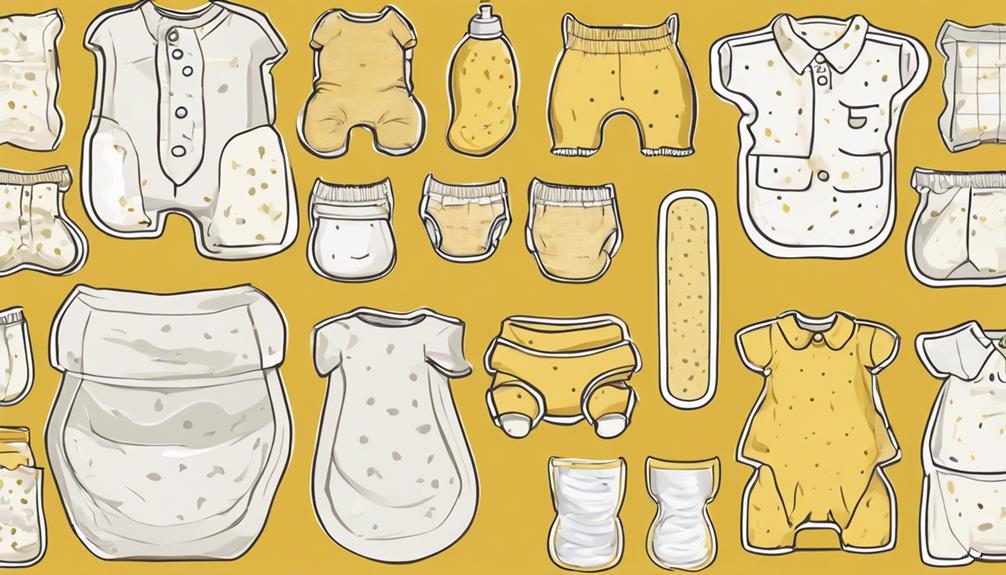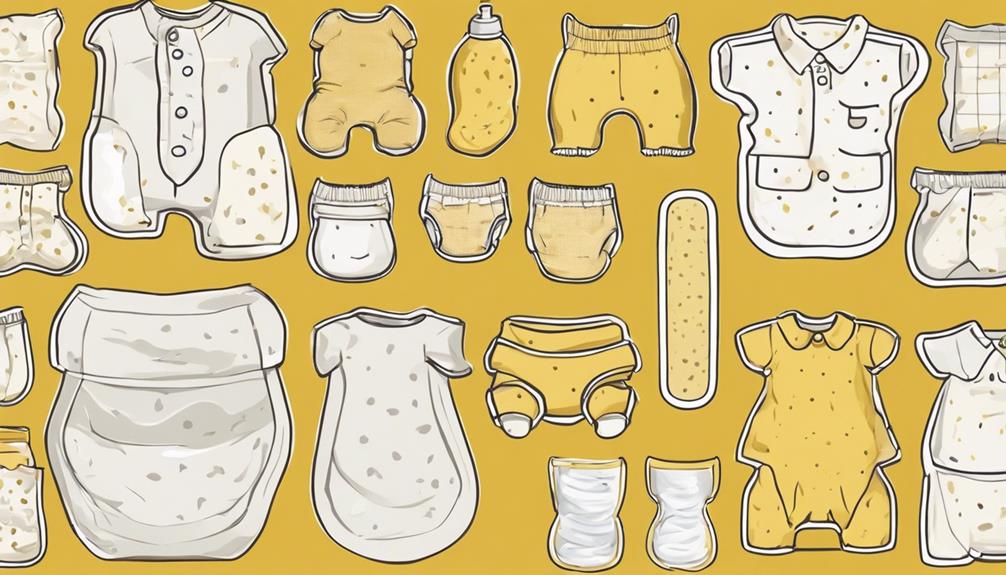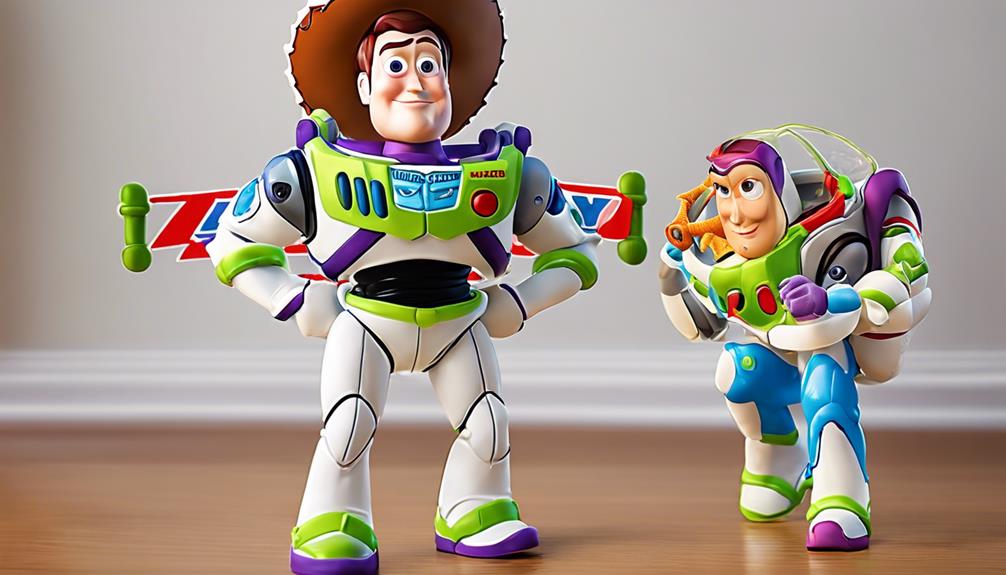When it comes to newborns and their diapers, decoding the contents can feel like cracking a secret message. The amount of poop a newborn should have can vary, causing parents to wonder what's normal.
Understanding the nuances of diaper changes can provide valuable insights into a baby's health and well-being. Let's unravel the mystery of newborn poop together, shedding light on what to expect and when to seek further guidance.
Key Takeaways
- Newborns should ideally have at least one soiled diaper per day in the first days of life.
- Breastfed newborns may have up to six mustard-yellow, seedy stools in the first six weeks.
- Formula-fed babies typically poop three to four times daily, reflecting healthy bowel movements.
- Passing at least one meconium stool in the first 24 hours is a positive sign of newborn health.
Normal Frequency of Newborn Bowel Movements
In the first few days of life, newborns should ideally have at least one soiled diaper per day, indicating healthy bowel function. Breastfed newborns tend to have more frequent dirty diapers, starting with one per day and increasing to around five by day five. On the other hand, formula-fed newborns typically poop three to four times a day, reflecting their digestive health. It's important to monitor poop frequency in newborns as changes can signal underlying issues. Lack of bowel movements for more than five days should prompt a pediatrician visit to guarantee the baby's well-being.
Understanding the normal frequency of newborn bowel movements is essential for parents to gauge their baby's digestive health. Diaper changes become an important indicator of a newborn's well-being, offering insights into their overall health. By keeping track of poop behaviors, parents can better understand their newborn's digestive patterns and address any concerns promptly. Grunting, straining, and grimacing during bowel movements are common as newborns develop their muscles and bowel habits. Regular monitoring and awareness of poop frequency are key aspects of caring for a newborn's digestive health.
Understanding Newborn Poop Consistency

Understanding the consistency of a newborn's poop is essential for parents to monitor their baby's digestive health effectively. Newborns typically pass meconium, a thick and dark greenish-black substance, within the first 24 hours after birth.
Breastfed newborns often have mustard-yellow stools, sometimes with a seedy texture, up to six times a day in the initial weeks. On the other hand, formula-fed babies tend to have stools that are tan or yellow in color, usually around 1-4 times a day. Stool consistency can vary greatly, from being quite runny to more formed, depending on the baby's feeding method.
Changes in poop color, texture, or frequency should be noted and discussed with a pediatrician if there are any concerns. Monitoring diaper changes and being aware of what's vital for your baby can be pivotal in maintaining their newborn health.
Signs of Healthy Newborn Poop
Monitoring a newborn's poop can provide valuable insights into their digestive health and overall well-being. In the first 24 hours post-birth, a healthy newborn should pass at least one meconium stool, a sticky, tar-like substance.
By days 3-5, observing a minimum of three poopy diapers daily indicates proper bowel movements, ensuring waste elimination. The size of a newborn's stool should be at least as big as an 'okay' circle, indicating sufficient output.
For breastfed babies, having up to six or more mustard-yellow, seedy stools in the first six weeks is considered normal and shows that the baby is receiving adequate feeding. As the baby's digestive system matures, the stool changes from dark meconium to yellowish seedy stools, reflecting positive changes in the baby's health and digestive function.
Regularly checking the contents of the diaper can assist in understanding the baby's well-being and whether feeding is on track.
Factors Affecting Newborn Poop Volume
Factors influencing the volume of a newborn's poop can vary depending on their feeding method and digestive process. Breastfed babies tend to have frequent bowel movements, with some having up to six or more dirty diapers a day in the first few weeks. On the other hand, formula-fed newborns typically have 1-4 bowel movements daily, often with larger stools compared to breastfed infants.
The shift from meconium, the baby's first stool, to regular baby poop colors is a significant milestone. Note that the frequency and amount of newborn poop can fluctuate from multiple times a day to once a week, depending on the baby's individual patterns. As a baby starts consuming breast milk or formula, their stool may change in consistency and color.
Monitoring the number of dirty diapers can offer valuable insights into a newborn's digestive health and overall well-being, aiding parents in understanding what's normal for their baby.
When to Consult a Healthcare Provider
If your newborn has less than one dirty diaper per day in the first week, it's important to consult a healthcare provider promptly. Newborn babies should typically have several dirty diapers a day, and any significant deviation from this pattern could indicate an underlying issue. Here are some key points to help you understand when to seek medical advice regarding your baby's bowel movements:
- Seek medical advice if your newborn has fewer than three dirty diapers per day after the first week.
- Contact a healthcare provider if your newborn hasn't passed meconium within the first 24 hours.
- Consult a doctor if your newborn's poop is hard, dry, or pellet-like.
- Seek medical help if your newborn shows signs of dehydration along with changes in poop frequency.
Being attentive to your baby's poop frequency and consistency can provide valuable insights into their health. Consulting a healthcare provider when necessary guarantees that any concerns are addressed promptly and appropriately.
Frequently Asked Questions
How Much Poop Does a Newborn Diaper Have?
Newborns vary in poop frequency. In the first days, three or more diapers daily is normal. Breastfed babies might have over six yellow stools daily, while formula-fed may have fewer in tan or yellow. Size matters too!
How Often Should a Newborn Have a Poopy Diaper?
We keep an eye on the diaper for signs of a healthy baby. Poop frequency varies, but generally, a newborn should have one or more poopy diapers daily. Monitoring output helps us guarantee the baby's well-being.
How Much Is Normal for a Newborn to Poop?
We observe newborns typically poop multiple times daily, with breastfed babies having more frequent bowel movements than formula-fed infants. Monitoring dirty diapers is essential; at least 3 stools daily by days 3-5 indicates a healthy digestive system.
How Big Should Newborn Poops Be?
Understanding newborn poop size matters, reflecting feeding success and digestion. It's like a guidebook for caregivers. When it's smaller than 'okay' circle, it might signal issues. Consult a healthcare provider for peace of mind.
Conclusion
To sum up, understanding the amount of poop a newborn should have in a diaper is an important aspect of monitoring their health. By observing the frequency, consistency, and color of their bowel movements, caregivers can guarantee their baby is healthy and thriving.
Remember, changes in poop patterns can indicate underlying issues that may require medical attention. Stay informed, stay vigilant, and always consult a healthcare provider if you have any concerns about your newborn's poop.









